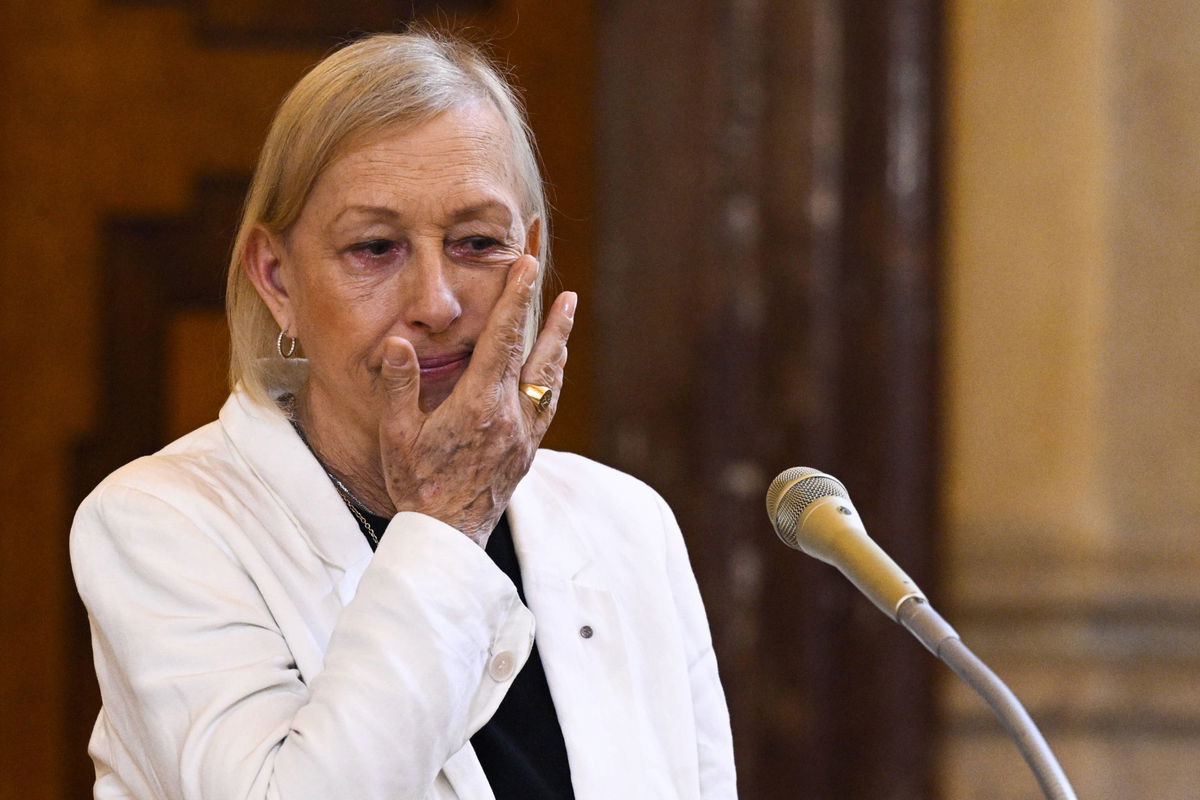
Imago
Martina Navratilova (Credits: Imago)

Imago
Martina Navratilova (Credits: Imago)
For many sports personalities, the spotlight dims quickly once they retire. The cheers, the victories, and even the pain and struggles seem to fade into the past, often forgotten by the bustling world of sports. Yet, there are a few exceptional athletes who manage to stay relevant and remind us of the enduring impact of their peers. One such person is the legendary Martina Navratilova.
Watch What’s Trending Now!
Navratilova took to her X (formerly Twitter) handle to pay tribute to the Soviet Gymnast Elena Mukhina, who faced a life full of challenges. This came after a user highlighted their admiration for the late gymnast and wrote, “I always think of one woman, when gymnastics is on, now 18 years since she died aged 46. Her name was Elena Mukhina, one of my heroes.”
Responding to the tweet, Navratilova highlighted a similar admiration and let her true emotions come out. “A heartbreaking thread. I remember her..,” she wrote. Indeed, Mukhina’s life story can be heartbreaking for many. But who was the gymnast who got everyone talking and even more so after her unfortunate demise?
ADVERTISEMENT
Born to a single mother in 1960 in Moscow, the star gymnast faced struggles since the early days. After her mother passed away just two years after her birth, her upbringing was assured by her maternal grandmother. Mukhina soon stepped into the world of gymnasts but could not become a top prospect until the 1977 European Championship in Prague. She won 3 gold medals on the balance beam, uneven bars, and floor exercise. She also became the All-around World Champion in 1978. But as she looked to rise up the ranks and compete at the Olympics, her journey was marred by a series of injuries.
A heartbreaking thread. I remember her… https://t.co/k7wtkd51PP
— Martina Navratilova (@Martina) August 5, 2024
In England in 1979, Mukhina suffered a broken leg accompanied by other injuries. While she was undergoing treatment, her coach, Mikhail Klimenko, allegedly asked the doctors to remove the cast four weeks early. Despite denying it initially, the doctors eventually gave in to the external pressures. The rushed recovery was then amalgamated with the pressure to master a dangerous and tumbling move, ‘Thomas Salto,’ which is now banned at the tournaments owing to the risks it involves.
ADVERTISEMENT
Many believe that Mukhina protested against this and denied practicing as she feared a neck injury. However, her coach forced her to practice this, which was followed by a disaster. The gymnast broke her neck just a fortnight before the Moscow Olympics in 1980 and failed to compete at the event. She was also left paralyzed, thereby marking an eventual end to her career.
While her life was saved, her movement was totally blocked as she faced immense pain in even picking up a spoon for years. Unfortunately, the star gymnast passed away in 2006, found in her apartment in Moscow due to “complications of quadriplegia.”
ADVERTISEMENT
As the world discusses Mukhina’s unfortunate life, Navratilova has paid significant tribute to the athlete. This is not the first time the 18-time Grand Slam champion has expressed her high regard for a fallen hero.
When Navratilova paid tribute to Czech gymnast’s enduring story
Martina Navratilova is known for voicing herself on many issues pertaining to women athletes. She has also ensured to pay tributes to the great personalities who have brought a significant change to women’s sports, and Vera Caslavska was one of them. Reposting her story last year, Navratilova took to her X and wrote, “A total hero:).”
ADVERTISEMENT
For the unversed, Caslavska was a Czech gymnast who had to flee her country following her opposition to the USSR invasion of Czechoslovakia. This made many believe that she would remain absent from the 1968 Olympics. Despite remaining away from all the practicing facilities, Caslavska made a last-minute entry to the Olympic games and won the gold medal in the women’s all-around category, defying all odds. Many reports suggested that she trained herself in a forest with logs and tree branches.
While such stories continue to take center stage, individuals like Navratilova have ensured to express the impact these players have had on the minds of the bubbling talents.
Top Stories
Frustrated Aaron Rodgers Clears Retirement Stance, Addresses Absence From Steelers Final Drive vs. Texans

Cowboys’ Rookie Sensation Donovan Ezeiruaku Arrested on Reckless Driving Charge

Chiefs Officially Cut Ties With 7 Players as Patrick Mahomes Pays the Price for Offensive Failures

Jerry Jones Announces Retirement Plans as Dallas Cowboys Owner Makes Triple Decision on Coaching Hiring

Mike Tomlin Announces Stance on Steelers Exit, Confirms Reason for Ditching Aaron Rodgers & Cam Heyward

Jordan Spieth Intervenes as Brooks Koepka Upsets PGA Tour Pros With ‘Return’ Announcement

ADVERTISEMENT
ADVERTISEMENT
ADVERTISEMENT

